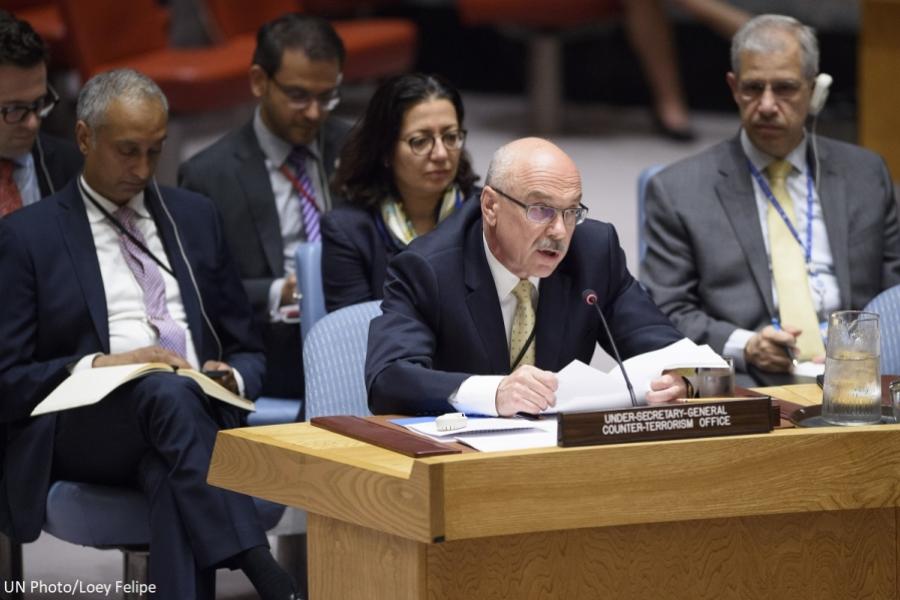Statement by Mr. Vladimir Voronkov, Under-Secretary-General of the United Nations Office of Counter-Terrorism Security Council meeting on Iraq
30 May 2018
Madam President,
Excellencies,
Ladies and Gentlemen,

On behalf of the Secretary-General, I would like to start by expressing my solidarity with the people and Governments where terrorist attacks were recently perpetrated – the list is long and includes Afghanistan, Belgium, France, Indonesia, Iraq, Libya, and Nigeria. Our prayers are with the victims and the survivors of these heinous crimes.
I also call on all Member States to redouble their efforts to strengthen international cooperation to address terrorism in a comprehensive manner, and bring those responsible to justice.
Madam President,
Thank you for this opportunity to brief the Security Council on the joint visit I conducted with ASG Michele Coninsx to Iraq in March this year. This visit was conducted within the framework of the common efforts of UNOCT and CTED to facilitate the delivery of counter-terrorism related technical assistance to Member States in accordance with Security Council resolution 2395. In this resolution the Council underscored the need for the two United Nations entities to work closely together.
The visit took place at the invitation of the Government of Iraq, and with the support of the United Nations Assistance Mission for Iraq, for which I am grateful. I am honoured to have the opportunity to brief you today alongside my colleagues CTED Executive Director Madame Michele Coninxs and Mr. Jan Kubis, Special Representative of the Secretary-General and Head of the United Nations Assistance Mission for Iraq as well as Permanent Representative of Iraq Ambassador Aluloom.
Madam President,
Iraq has been affected by and is suffering severely the consequences of terrorism. The military set back of Da’esh clearly demonstrates the long-term resolve of the Iraqi authorities in their fight against terrorism. The continued vigilance and the determination of the Iraqi Government to consolidate the military victory against ISIL through a comprehensive approach focused on both prevention and resilience is of utmost importance. In this regard, I would like to stress the continued commitment of Iraq in addressing the 16 recommendations made by the Counter-Terrorism Committee of the Security Council on advancing Iraq’s efforts on implementing key counter-terrorism priorities.
Madam President,
During our joint mission with CTED to Iraq we were able to have high-level consultations with a number of ministers and senior officials. In order to understand better the realities on the ground, we visited Fallujah to discuss what could be additionally done from the UN side to support the local population.
All our interlocutors stressed Iraq’s continued commitment to fighting terrorism as it transitions from a military-focused counter-terrorism approach to a more comprehensive one, which also includes preventive, law enforcement and criminal justice components. It was the conclusion of our Iraqi interlocutors that national reconciliation and reconstruction, owned and driven by the Iraqi people, are essential to prevent the resurgence of violent extremism and terrorism in Iraq. I would like to express my words of appreciation for this kind of approach.
During our visit to Fallujah, we had the opportunity to meet with the mayor of the town and some survivors. We were witnesses of the large scale devastation caused by ISIL. I was personally touched by the admirable resilience of the Iraqi people while visiting the reconstruction work in areas surrounded by mine fields and booby traps, and youthful faces studying in rehabilitated school premises.
Our joint delegation reiterated the United Nations’ strong support to Iraq. Based on the priority needs identified during the mission and on Security Council resolution 2395, the United Nations Office of Counter-Terrorism proposed five areas in which it could provide technical assistance to Iraq:
Firstly, advice for the development of a comprehensive national counter-terrorism strategy; secondly, training on countering the financing of terrorism; thirdly, PVE through youth skills development and vocational training, including for youth in Fallujah; fourthly, PVE through strategic communications; and finally, capacity building to prevent and respond to Weapons of Mass Destruction (WMD) related terrorism.
In order to move expeditiously on our fruitful dialogue and in consultation with the Government of Iraq and UNAMI, we were able to dispatch a joint UNOCT-CTED scoping mission to Iraq at the beginning of May to identify the specific elements of programmatic support under the five priority areas. The scoping mission held meetings with a range of Iraqi ministries and national agencies, the diplomatic community, as well as the UN country team and the World Bank. Based on the findings of the scoping mission, UNOCT is working now on the development of project concept notes on the priority thematic topics. It is going on about projects that could have a measurable impact on the ground while avoiding duplication with existing initiatives. UNOCT is also planning to deploy a consultant to support Iraq finalize its national counter-terrorism strategy. The practical implementation of these projects in consultation with the Government of Iraq will start next month.
Madam President,
Distinguished colleagues,
As the Secretary-General has often emphasised, UNOCT is committed to deliver on key counter-terrorism capacity building priorities of Member States, as “one UN”, in a coordinated and coherent manner, and as requested by Member States. Our first joint CTED-UNOCT mission to Iraq in collaboration with UNAMI was a concreate step in that direction. We plan to further build on this approach in other regions of the world.
Thank you.

